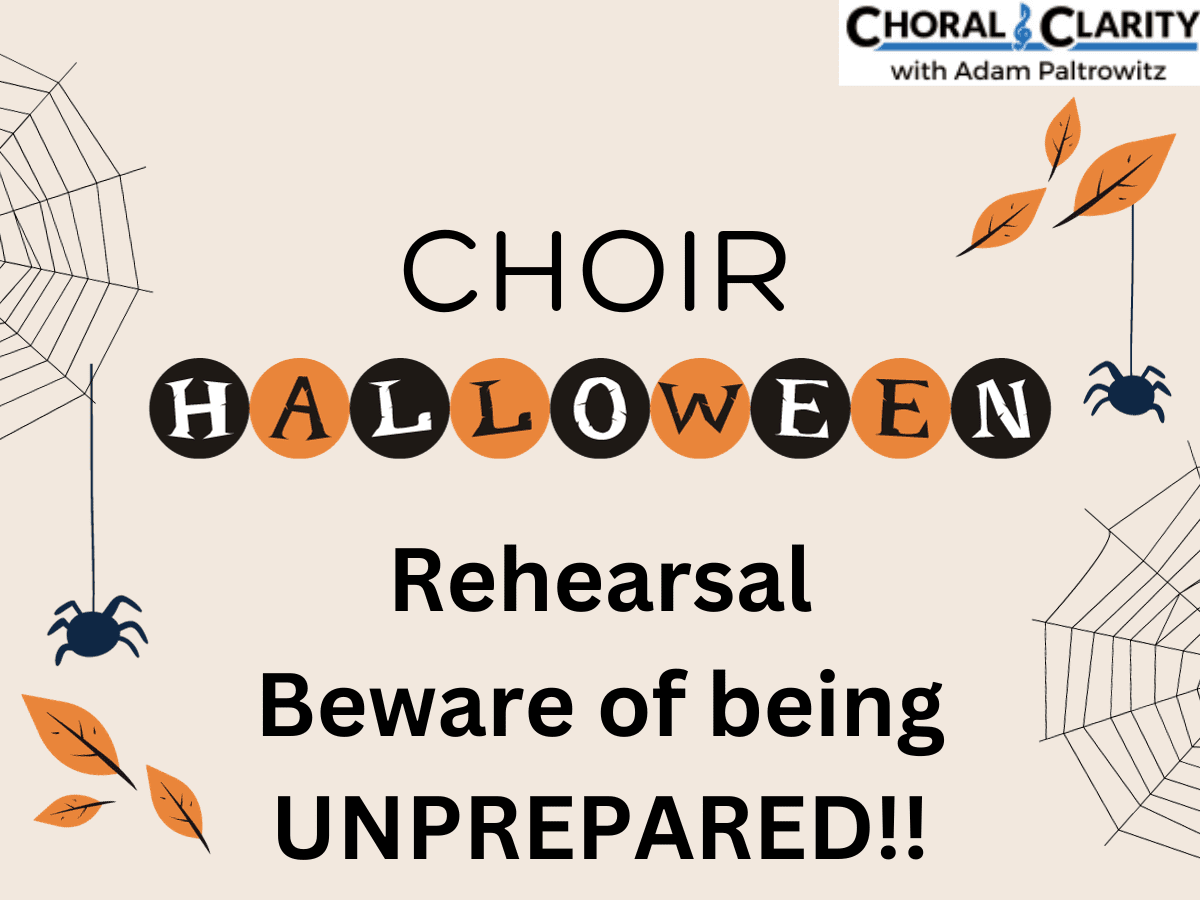Should we force our choir members to sing solo?
The simple answer is: we should not force our students to do anything. So that brings us to a follow-up question:
Should we encourage our choir members to sing solo?
The answer is: definitely, but this question does not bring clarity or resolution to the age-old question about singing alone. Perhaps the best question here is:
Should we expect our choir members to sing solo?
Before I give my answer, I want to discuss the difference between the three opening questions.
It’s interesting how, to many people, these three questions appear to be similar. Simply put, they are not.
Look at these three words:
- Force
- Encourage
- Expect
Let’s put these three words into another situation. Here are three statements regarding my children at dinner time:
- I force my children to eat their veggies.
- I encourage my children to eat their veggies.
- I expect my children to eat their veggies.
If I force my children to eat their veggies, I could say, “You are not leaving this table until those veggies are eaten,” and keep them there all night. I could also physically force them to eat their food. They don’t have a choice because I’ve forced them to eat their veggies.
If I encourage my children to eat their veggies, I could use positive words such as “eating veggies will help you to grow big and strong” or “you need to eat those veggies to be healthy”. I could also encourage them with a bribe: “if you eat your veggies, I’ll let you have a treat”. The children not only have a choice but there is no expectation for them to eat their veggies. Yes, there is a presented benefit, either intrinsic or extrinsic, but they have the ability to assess the value of the benefit and decide if is really worth it to eat their veggies.
SAVE 10% on SIGHT READING FACTORY
If I expect my children to eat their veggies, I have created an environment where they understand this is what is supposed to happen. I have made a conscious decision that my children should be eating their veggies, and it has been established that this is what is expected of them. Prior to a meal, my children know they are expected to eat their veggies. What happens if they do not eat their veggies? Well, that depends.
There may be consequences based on the situation. They may lose their treats, screen time privileges, or story time before bed. But there may not be any consequences. It all depends on why they didn’t meet the expectation, along with additional factors that may present themselves.
Expectations are set to be the norm, not a governing law. We set expectations for everyone’s benefits. Our children are expected to eat their veggies because it’s good for them, and helps them to grow big and strong, and keeps them from getting sick. We have many reasons why we expect them to eat them. As their parent, I know that if they do not eat their veggies most of the time, they will be less healthy.
As a result, as their parent, I believe it is my job to help them to be healthy. I didn’t force them, I do encourage them, but in the end, I expect them to eat their veggies.
Enough Veggies……..Should we “expect” our choir members to sing solo?
“Forced” implies students do not have a choice. It implies they will be doing this against their will. It also implies there is an aggressor who is inflicting this action.
“Encouraged” implies it’s our job to convince our singers that they should want to sing by themselves. It implies if they have not felt encouraged, they shouldn’t sing.
“Expected” implies membership in the choir involves singing by themselves. A student who doesn’t do what is expected is an exception.
Save 15% on the most intuitive music notation program on the market!
I believe every member of a choir should be expected to sing by themselves. This does not mean they must audition for a solo or sing by themselves in front of the class. It means every individual voice matters because every person matters. The easy route is to allow students to voluntarily sing by themselves but this encourages the confident singers to continue to shine and allows the less confident singers to hide.
While some students may eventually choose to sing out, there will become an even greater divide between the “volunteer” singers and many of the ones who never sing by themselves; this divide goes far beyond the developing of their singing voice. Besides confidence, it will also effect their long-term level of engagement, and value of the experience.
I believe it is my job to create a positive learning environment which includes setting the expectation that everyone is here to individually grow. It is my job to ensure all singers feel supported when they sing by themselves. When students sing by themselves, they gain accountability, and this is when they can begin to take ownership for their own growth. This is when they gain confidence. This is when they begin to believe they matter.
What happens when students don’t sing solo (when it IS the expectation)?
First off, I never expect singers to sing by themselves in front of the choir. I do expect them to briefly sing by themselves in groups of 8 or less. When a new student isn’t ready to sing by themselves in a small group setting, I offer them the opportunity to meet with me one-on-one for extra help for 5 minutes as frequently as possible until they become ready to sing in the expected setting.
Sight-Singing Developmental Rubric – for developing students who lack underlying sight-singing skills
Are there some students who express fear or discomfort with singing solo?
Every year I may have a maximum of one or two new singers who need to ease their way into singing by themselves in a small group. At their group lessons or sectional, I always engage them the exact same way I engage every other students; sometimes they jump right in and sing and other times they express fear and I tell them that I understand they aren’t ready to sing and move right past them.
I give them that same chance every single time we move around the room but hold no negativity toward them if they lack the confidence to sing; they just know I expect them to meet with me privately. While students know I expect them to sing alone, not everyone is going to meet every expectation we place on them.
Sight-Singing Developmental Rubric BUNDLE
Have students dropped out of choir because they refused to sing solo?
Well, I’m sure they were students who never enrolled in the first place because they heard rumors they might have to sing by themselves. But just as this is possible, there are also students who don’t join choir because they’d heard other rumors. “They don’t sing cool songs.” “The class is demanding”. I view myself as a motivator, but I can only motivate someone who doesn’t already have their mind made up.
I would also prefer having a room filled with potentially self-motivated participants who understand the expectation of singing solo over a room with double the amount of students who I’m constantly “encouraging” to sing solo.
Those hypothetical extra students in the second scenario who would have opted not to sing by themselves would likely have inhibited many of the original students from the first scenario; as a result, many of the same students who met the expectation to sing solo in scenario one would have opted not to sing in scenario two.
Has anyone dropped after the first day/week of school because they had to sing by themselves? The answer is yes. I would say an average of 1 student each year drops for this reason. But there are usually 2-3 students who drop for other reasons. All in all, not only do 97-98% of the students on the first day stay, the retention rate for the program is way over 90%, year after year.
One of the main reasons why the retention rate is so high is because all students have ownership in the program. I believe a large reason why they have ownership is their empowerment which comes from singing solo. All students sing by themselves because it is my expectation and that expectation is part of a positive, supportive, and engaging learning environment.
Final Words
There are several different ways in which I expect students to sing by themselves. First we must fostering a supportive environment for all students to gain comfort in singing by themselves.
There are certainly ways I recommend and ways I do not recommend. Stay tuned for my 5 Do’s (and Don’ts) for Requiring Choir Members to Sing Solo!













Leave A Comment